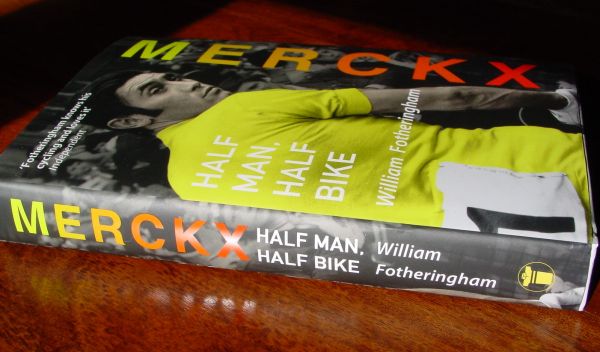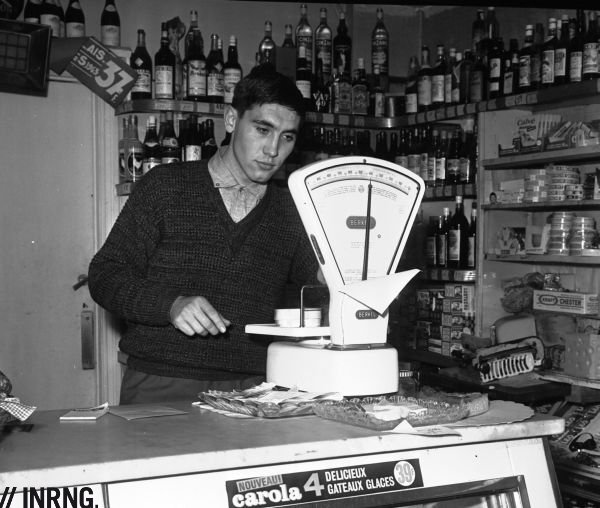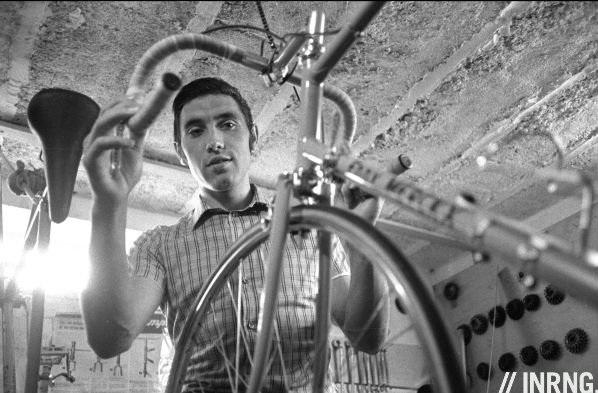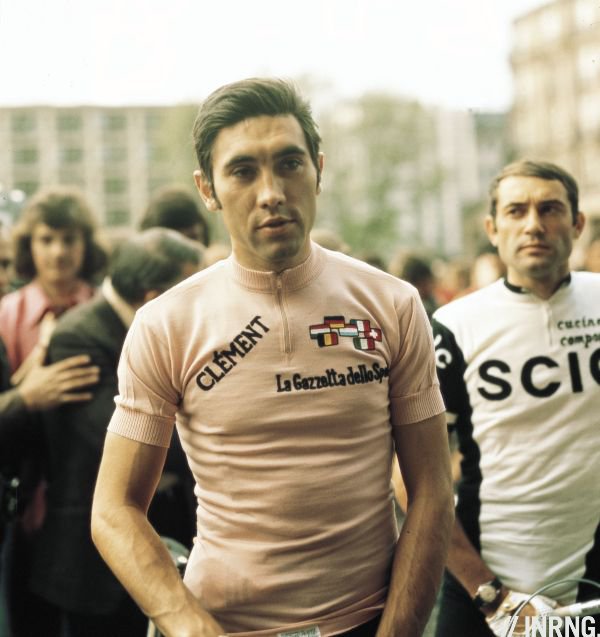
Merckx: Half Man, Half Bike by William Fotheringham
525 wins. Some of these were kermesse races that aren’t recognised today but this only reminds us that Eddy Merckx didn’t got for recovery rides, he raced.
I’m learning about cycling every day but I know surprisingly little about Merckx. Various ideas come to mind. The rocking shoulders, the sideburns, winning all the jerseys in the Tour de France in the same year, the son of a shopkeeper from a Brussels suburb, the brown Molteni jersey and more. William Fotheringham’s book links all these mental images together and builds them into a fine history of the Belgian’s career.
The book takes a chronological path through Merckx’s life, beginning with a brief tale of murder and collaboration during the Nazi occupation of Belgium that went on to touch on Merckx’s career. There is plenty on his young life and family environment. We learn of his nervous father, the time when a young Merckx divided his time between school, his parents’ shop and riding his bike.

There are so many small anecdotes, many make impress and wow. Small details, like how Merckx needed a chair in his shower after a race because he was so tired he could not stand. He would smoke from time to time, getting cigarettes off the team’s smoker… another rider and apparently it relaxed the lungs. Other nicknames for “The Cannibal” have not lasted, “The Crocodile” for example.
These nuggets appear time after time as Fotheringham chronicles Merckx’s triumphs. Often individual stages of a grand tour win are recounted. Today we might think the Tour de France is won thanks to a few key efforts on top of consistent and conservative strong riding. Yet Merckx thought nothing of attacking with 100 kilometres to go on a mountain stage or even a flat one. If he had five minutes lead on the overall classification then Merckx did not feel satisfied, instead he would attack to increase this margin just in case he punctured or crashed later in the race and lost time. The new style of racing is recounted in impressive detail, it appears Fotheringham has sifted newsreel footage, documentary films, race reports, press cuttings and interviewed people present in order to retell Merckx’s greatest rides.

As well as races there is reflection. Attacking when you have the yellow jersey and comfortable lead might sound like outrageous domination but the book hints at insecurity too. Merckx just worried he could lose the lead, better to increase the margin. Similarly Merckx was constantly tinkering with his bike, adjusting saddle height mid-race or even demanding a frame is put on the next plane to Switzerland so he can race on it the next day because the geometry was better.
I was pleased to see Antoine Blondin regularly cited. Blondin chronicled the Tour de France for L’Equipe, taking a poetic stance on each day’s events, often fuelled with wine and brandy. After Merckx’s victorious solo breakaway of 130km across the Pyrenees in his debut Tour de France Blondin wrote:
“There is something of the Olympic flame in the red wick that illuminates the sunset as Merckx sleeps in the purple cradle where living gods are born”.
You don’t get phrases like that today. Blondin delivered this lyricism daily in July. L’Equipe and Blondin’s need to find new angles on the racing reveals one frustration with the book. “Merckx wins” is repetitive, both to write and to read. Back in the day race organisers, the media and public all found this too repetitive. Like rushing through an art museum, if you read too much of the book in one sitting then everything gets blurred into one. It is as if Merckx had five minutes lead on the cobbles of the Passo Stelvio during a snowstorm on his way to another win in the Vuelta a Espana.
When asked if Merckx’s imperial rule was harming the sport, Fotheringham writes:
The French writer Pierre Chany saw this, producing the perfect riposte…“has anyone wondered whether Molière damaged theatre… Bach harmed music?”
I agree but just as you wouldn’t sit through all of Bach’s compositions in one go, I suggest you pace yourself with this book to get the best out of it.

One unanswered question is what made Merckx so able? Fotheringham explains the psychological factors that drove Merckx in great detail, all the way from childhood to team tactics but there is little mention of his physiological qualities, except admiration for his resilience. The phrase “sports science” probably didn’t exist during Merckx’s time so I don’t know if anyone even measured his VO2 Max or lung capacity. But I’m still keen to know just what made Merckx so strong. Before I was interested in cycling I heard tales of Merckx and recall someone saying his thighs were disproportionately long compared to his lower limbs, giving him more leverage; I don’t know if this claim is true nor if it offers bio-mechanical advantage. But was it down to long legs, giant lungs or what? If he often performed well in the cold, did he suffer in the heat? My curiosity here isn’t yet satisfied.
Summary
I enjoyed this excellent and well-researched book that tells of Eddy Merckx, his background, the victories and even how he changed cycling. Thanks to this book I’m now far more appreciative of Merckx. If you enjoyed seeing Andy Schleck or Alberto Contador attempt long range breakaways in the Tour de France last July I think you’ll like this book; if you want to learn more about Merckx this is a must read.
There’s a strong a focus on the motivational forces, along with detailed accounts of his greatest triumphs and even the lows he experienced. Just don’t try to cram this book into a single session like a long haul flight, I think you will find it more rewarding to read a chapter and return at a later point.
Disclaimer: this book was sent by the publisher for review.
A list of book reviews is available at inrng.com/books.

His smirk, worringly, reminds me of Sasha Gray’s.
I love Merckx… Gotta have this book! Thanks!!
Sounds like a good read. How would Merckx do in today’s races?
Chris: where to start with a question like that? In many ways he and his team started some of the modern trends so I think he would fit right in. But with more race radios he might find it harder to escape, plus many of his rivals in the grand tours were mountain climbers who are today quite rare.
Comparisons across history are hard but the hour record is interesting. Fotheringham explains how Merckx didn’t pace himself during his attempt, going very fast at the start and paying for this later. This was a weak point that was exploited by Chris Boardman who managed to pace himself to pip Merckx with his “classic attempt” on a bike with drop bars. With power meters and sports science and aerodynamics it is probable that Merckx would have added more to the hour record, substantially more even.
But perhaps we should not compare? He did what was required during the time he was racing and his record is incomparable.
Any idea when the book becomes available (especially here in the States)?
Nice review! I’m looking forward to digging into this over the weekend. And pleased to learn that Blondin features extensively. Has anyone ever collected his cycling writings? In French or translated? That would be a worthy read, too.
Rod: tomorrow (March 22) I’m told.
Velonista: yes there is a book of Blondin’s collected chronicles but it is out of print and a rarity these days. I have a copy.
Nice review, this book will go on my “must have” list. Fotheringham’s Coppi book was pretty good, sounds like he’s done another good job with this one. Regarding Blondin – the Italians can still crank out a phrase or two like this even today, the craft of writing well is not totally dead. I’ve said many times that I thought being a cycling fan (but not a raving Merckx fan) during Eddy’s time must have been boring, but as I get older I believe that less and less. There were a lot of interesting characters trying to make Eddy’s life tough back then, even though they rarely seem to succeed.
Larry T: the Italians had Dino Buzzati, a novelist, poet and painter who sometimes chronicled the Giro for the Corriere della Sera.
Simply can’t wait to read this, my birthday soon so it’s on the list !
Apparently he had a “big heart”: http://www.france24.com/en/20120321-cycling-legend-merckx-had-heart-problem-book.
Kasper: just read the same too. In the book above some heart problems were apparently diagnosed before he turned pro but it was a ruse to keep him out of the Belgian national team by selectors keen to pick “their” riders as opposed to Merckx.
Inrng: I read another review of this book in Fotheringham’s own newspaper (or one of them), The Guardian. It was much more guarded, and even criticised the book for not talking more about doping, when you would’ve expected a ‘home’ reviewer to be very positive. I got the impression that the reviewer wasn’t a big fan of cycling…
In short, would you say this is a cycling fan’s book rather than a ‘general public’ book? (If you say ‘yes’, that’s probably a good sign!) Thanks.
@inrng Thanks for the note on the release date! I was unable to locate that info anywhere else!
Rooto: the book mentions doping, indeed Merckx was involved in controversy and this is covered. As for whether this is a book for the general public or for cycling fans, interesting question. Certainly it is for cycling but I’d not considered whether it would suit a non-cyclist. Thinking about it, it does not assume full tactical knowledge and explains other things that readers of this blog might take for granted. Then again the tale is very much one of a racer and racing. A force on the bike, Merckx was not a giant charisma off it.
The Inner Ring:
Anytime a biography comes out, I always ask myself:
A) Has this already been covered
B) Is this uncovering old stories, but with new viewpoints.
C) Is this really adding to the conversation or is this just trying to cash in on a topic that people will gobble up.
D) Is more a celebrity piece or an honest, in-depth look into the individual being covered.
The “Death of Marco Pantani” clearly was a book which was meant to tell a story about a troubled individual, and add insight and perspective that time has perhaps finally allowed.
This book, and I mean no-disrespect, seems to lack a certain “gravitas” and indications that it was well researched. Just based on this review and comments alone, it seems an awful lot of questions, issues and topics were really not covered or dealt with, and this seems so much more like an extended version of a profile piece from Velonews.
As an addendum:
It may have been well researched in terms of using old quotes and cycling media pieces, but did you learn anything of Merckx the person? I cannot tell..it sounds like more a recounting of his races….but little in the way of understanding Merckx himself.
Cat4Fodder: good points. There’s little that is original given Merckx has probably said everything there is to say and some of his peers are dead. But reading this book has saved me from watching several documentaries, reading biographies in Flemish and French and sifting through archive material from the past. It’s put everything in one English language book. So yes, I learned plenty.
telegraph.co.uk/sport/othersports/cycling/9157923/Eddy-Merckx-became-greatest-cyclist-that-ever-lived-with-life-threatening-heart-condition-former-doctor-reveals.html
Thank you for the review, it has gone on my book voucher spend list. 🙂
Cat4-have you read Fotheringhams book on Coppi? He did some pretty serious research for that one and I’d be surprised if this one isn’t as well-done. Mr. Inrg – have you read any of Fotheringhams other work to give us a comparison?
I’d be interested in heariing how this compares to the book that Daniel Freibe has written. It’s where the claims linked in a comment above about Merckx’s heart condition come from.
Larry T: actually I haven’t. But after this I’ll look up the book, thanks.
jim: I’ve just been sent that book for review and am going through it. I’ll aim to review it in its own right… but I suspect comparisons will be inevitable.
there is another Merckx book, also released today! Has anyone any info on it. Seems strange books on Merckx, I saw them both in Waterstones. I think the name is Daniel friebe who has written the other book.
I agree with Larry T, Fotheringham’s book on Coppi is probably within the top 3 of books I read on cycling. Really well written and full of anecdotes , well-researched. I could not put it down.
For those in London, Dan Friebe will be at Look Mum No Hands to talk about his Merckx book on Thursday at 7pm.
I second Cat4Fodder’s comments and wonder why it is that a great sport like this spawns so little in the way of good, net alone great, writing? OK, most sports books are total crap (Sturgeon’s Law). Baseball, specifically Major League Baseball, has few beauties. Are there any good cycling ones in the Romance languages?
I promised myself never to waste another moment on a ‘history’ of the TDF. Tedious re-writes of the same stories written by journos in bars a long way from the action.
It could be (as Inner Ring suggests), that this is inherently a problem with Merckx himself. He was not a flamboyant character, and he to this day seems to shy away from really opening up to the public. He seems to enjoy his retirement as an ambassador for the sport, smiling on podiums.
But….I think a better book would be to really try to understand how this man was so dominant. Was he just a freak of nature (as compared to other pros…yes – he clearly was a freak of nature compared to the general public). Did he just really work harder? I think perhaps trying to pin more down on explaining how someone like Merckx arose and why we have not seen anyone since would help explain. And since he is still alive, but aging, this is opportunity to get some first hand accounts is dwindling.
Haven’t read this yet but while we’re on book reviews, I think Richard Moore’s cycling-related books are good. Although UK-centric, his “Wide Eyed and Legless” on the doomed ANC-Halfords first (and last) tilt at the Tour in 1987 is good fun. One story demonstrates how Malcolm Elliott might have rivalled Super Mario for playboy behaviour! I haven’t read his recent book on the establishment of Team Sky but others reckon it is good.
Richard Moores book on Robert Millar is exceptional in my opinion. I loved the paradox in Millars psyche, hard to understand, a loathing of the press. But the people who new him speak of a man with tunnel vision, & genuinely seem to love him. I always wonder if he hadn”t been robbed of the Vuelta in 85, if he wouldn”t have gone on to finish on the podium in the tour! I would love Moore or Fotheringham to do a book on Sean Kelly, or maybe Kelly & Roche together. How Sean inspired him, i mean only Merckx has more professional wins than the great Sean Kelly…
I bet EM had one of those 40% larger-than-normal hearts….
you know, like Lance’s.
Didn”t Indurian have abnormally large lungs. What made Merckx great, was his obsessive attention to detail! Miles better than Armstrong, Lance only focused on the Tour. Eddy was kicking ass in the classics, & Giro. Not to mention various other races, like Paris Nice. Oh forgot his 3 World road race titles. I wouldn”t rate Armstrong, in the top boys of racing. The drugs cloud is still there!
If you go to wikipedia and read up about the history of triathlon they mention how the bike section was added after a navy admiral had read in a newspaper about Merckx’s VO2 max and was so impressed he felt that cycling had to be included in the 3-part sport event the US navy was developing!
Tricky Dicky: ‘Wide-Eyed and Legless’ is by Jeff Conor – only introduced by Moore I think. A lively read. Paul Kimmage’s ‘Rough Ride’ is a must – may be the first cycling book to be really honest about doping?
I admire Fotheringham’s and Moore’s books, but as has been pointed out here there are real limitations to biography. For me it’s the books that provide an analysis beyond the personalities that are often more challenging. Christopher Thomson’s academic history of the Tour de France is a compelling effort to analyse the history of the race, as is John Foot’s ‘Pedalare! Pedalare! A History of Italian Cycling’. I’ve not read any of Matt Rendell’s books, but I’ve head people recommend them highly.